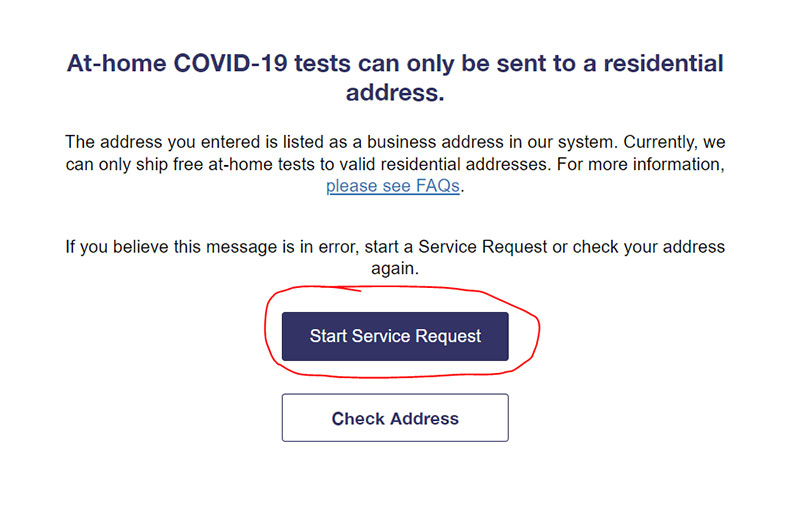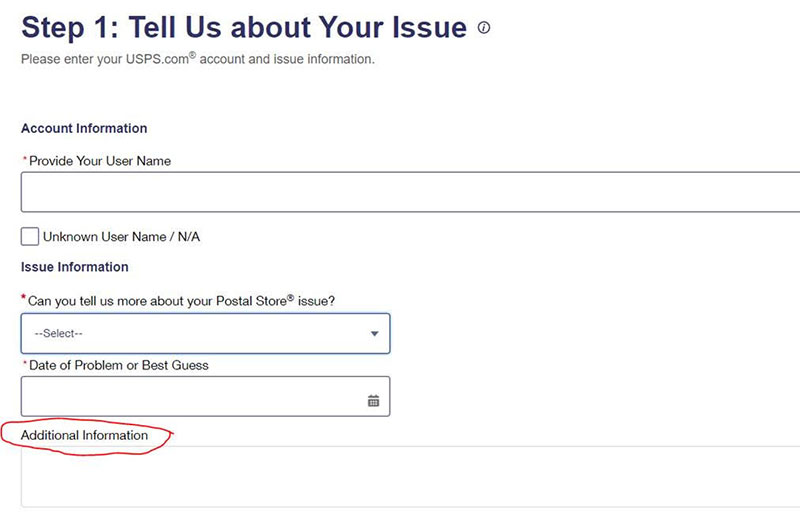
COVID-19 (Coronavirus)
Personal Mail Boxes (PMBs) and
Accessing Free At-Home COVID Test Kits
USPS has still not entirely resolved the issue of sending these kits to Personal Mail Boxes (PMB). However, they have created a service request system, which will enable you to receive test kits to a PMB.
If you have a PMB and would like to request the free test kits:
- You will need to start a service request after receiving the “residential address message” (see screenshots below), and
- In the “additional information” area, explain that your PMB is for a residence (see screenshot below).


Order Testing Kits Online: https://special.usps.com/testkits
Order over the phone: 1-800-232-0233 (if you do not have internet access)
Pala COVID-19
Updates
Updated Wednesday, June 1, 2022.
County Updates
San Diego County
Stay up to date on San Diego County Covid-19 cases.
Riverside County
Stay up to date on Riverside County Covid-19 cases.
Page Updates
- Community Updates, 2/16/22
- COVID-19 Vaccinations, 1/15/21
- COVID-19 (Coronavirus) Outbreak – Cancellations, Closures, and Alerts, 3/20/20
- COVID-19 (Coronavirus) Outbreak – What You Need to Know, 3/31/20
- CDC Youtube Channel, 12/4/20
- CDC Face Coverings Do’s and Don’ts, 5/27/20
Community Updates
- Pala Band of Mission Indians. Community Notice: COVID-19 Vaccines Saves Lives (June 2022)
- Pala Band of Mission Indians. Community Notice: Personal Mail Boxes (PMBs) and Accessing Free At-Home COVID Test Kits (February 2022)
- Pala Band of Mission Indians. Public Notice: Masks will be Optional to Enter Any Pala Facility or Department (February 2022)
- Indian Health Council. Public Notice: IHC COVID-19 Testing Clinics (January 2022)
- Indian Health Council. Public Notice: IHC COVID-19 Vaccine Clinic (January 2022)
- Pala Band of Mission Indians. Community Notice: COVID-19 PCR Testing for Tribal Members (January 2022)
- Pala Band of Mission Indians. Community Notice: COVID-19 At-Home Tests (January 2022)
- Pala Band of Mission Indians. Public Notice: COVID-19 PCR Testing (Janaury 2022)
- Pala Band of Mission Indians. Public Notice: Mask Requirments to Enter Any Pala Facility or Department (January 2022)
- Pala Band of Mission Indians. Public Notice: PBMI will no longer be requiring Masks at Tribal Facilities (June 2021)
- Indian Health Council. Public Notice: Free COVID-19 Drive-Thru Testing (February 2021)
- Indian Health Council. Public Notice: IHC COVID-19 Vaccine Clinic (February 2021)
- Pala Band of Mission Indians. Free Pala & IHC COVID-19 Drive-Thru Testing (Janaury 2021)
- Pala RV Park. Public Notice: Free Pala RV COVID-19 Drive-Thru Testing Schedule (January 2021)
- Indian Health Council. Public Notice: Free COVID-19 Drive-Thru Testing (January 2021)
- Indian Health Council. Public Notice: Free COVID-19 Drive-Thru Testing (December 2020)
- Indian Health Council. Public Notice: Free COVID-19 Drive-Thru Testing in San Pasqual (November)
- Indian Health Council. Public Notice: Pala Community Drive-Thru Flu Clinic
- Pala Band of Mission Indians. Announcement: ICDBG CARES Act (Imminent Threat) Grant Award
- Pala Band of Mission Indians. Notice: Health Screenings Required to Enter the Pala Admin Building and Cloth Face Coverings Required to Enter Tribal Facilities
- Pala Casino. The Pala Casino is opening May 22, 2020
- Pala Band of Mission Indians. Notice: Cloth Face Coverings Required to Enter Tribal Facilities
- Pala Band of Mission Indians. Community Notice: Letter from Chairman Smith & COVID-19 Updates
- SCTCA Tribal TANF Program. Notice: SCTCA Tribal TANF Non-recurrent Short-term Benefits
- County of San Diego. San Diego County Public Health Order (Updated 4/10/20) San Diego County has issued an updated public health order as of Friday, April 10, 2020. The update tightens the order to include a prohibition on gatherings of any size, whereas previously it prohibited gatherings of 10 people or more and merely recommended against gatherings of fewer than 10 people.
- County of San Diego. Public Notice: County of San Diego Health Order and Facial Coverings
- Pala Band of Mission Indians. Announcement: Postponement of 46th Annual Cupa Days, Announcement: Postponement of Kupa Cemetery Warner’s Gathering, Announcement: Cancellation of 2020 Annual Easter Egg Hunt
- SDG&E Service. SDG&E Services during COVID-19 Stay at Home Order.
- Pala Band of Mission Indians. Public Notice: PBMI Declares a Public Health Emergency
- Fox Raceway, Pala Skatepark, and Pala Fitness Center. These facilities have temporarily suspended all operations. Announcement: Temporary Closure of Raceway, Skatepark, and Fitness Center
- State of California. Governor Gavin Newsom Issues Stay at Home Order. The State of California has ordered all residents to stay at home until further notice. Everyone is required to stay home except to get food, care for a relative or friend, get necessary health care, or go to an essential job. If you go out, keep at least 6 feet of distance. [see COVID-19 (Coronavirus) Outbreak – Cancellations, Closures, and Alerts below]
- Senior Meals. In-person daily meals for seniors at Pala Administration building will be discontinued as of Monday, March 23, until further notice. The kitchen will continue to operate to prepare and deliver daily meals. To sign up for delivery, Pala seniors can contact Shannon Cagey at 760-891-3505 or Samantha Scott at 760-891-3507.
- Propane. Pala residents are advised to check their propane supplies and be sure to have 6 to 8 weeks’ worth on hand. Fallbrook Propane is accepting checks and credit cards only.
- SDG&E Service. SDG&E has temporarily suspended all service disconnections until further notice.
- Indian Health Council. Indian Health Council in Rincon has set up a COVID-19 Page and Triage Nurse Line: 760-751-6019. Call before coming to the clinic if you have a non-urgent health problem. All visitors will be screened for COVID-19 symptoms before entering the clinic.
- Pala Mini Mart. The Pala Mini Mart will temporarily be operating on a modified schedule: 7:00 a.m. to 8:00 p.m.
- Pala Casino. Pala Band of Mission Indians Announces Temporary Closure of Pala Casino to Prevent the Spread of COVID-19
COVID-19 Vaccinations
COVID-19 (Coronavirus) Outbreak
Cancellations, Closures, and Alerts
Essential services will remain open such as:
- Gas stations
- Pharmacies
- Food: Grocery stores, farmers markets, food banks, convenience stores, take-out and delivery restaurants
- Banks
- Laundromats/laundry services
Essential state and local government functions will also remain open, including law enforcement and offices that provide government programs and services.
- Dine-in restaurants
- Bars and nightclubs
- Entertainment venues
- Gyms and fitness studios
- Public events and gatherings
- Convention Centers
The order is in effect throughout the State of California.
The state has a coronavirus response website with regularly updated information at covid19.ca.gov.
Practice social distancing. Keep a distance of 6 feet between yourself and others in public. Refrain from touching – no handshakes, hugs, or kisses.
The federal government is advising all people to stay in their homes as much as possible.
The State of California has issued a “stay at home” order. All non-essential businesses must close and non-essential employees must stay at home and can only leave for food, essential medical care, and for exercise (while maintaining a minimum of 6 feet of social distance). All restaurants must close their dining rooms and only prepare food to go or for delivery. Social distancing will be required for persons picking up food on premises.
San Diego County has banned all “non-essential personnel,” including members of the public, from entering any hospital or long-term care facility serving seniors.
Everyone is urged to stay home as much as possible.
Check your school or school district website for updated information
All schools in California are closed under the state-wide stay at home order.
- All tribal Earth Day events cancelled or postponed
- Cupa Days postponed
- Kupa Cemetery Warner Springs Gathering postponed
- All casinos closed until further notice
County Launches COVID-19 Text Message Alert System
County residents can now receive information about the novel coronavirus via text thanks to the County COVID-19 public information text message alert system.
The system allows County health officials to send real-time information about COVID-19 in the region. To sign up to receive the messages, text COSD COVID19 to 468-311.
Text COSD COVID19 to 468-311
The system was set up to let County public health officials issue information and instructions on changes related to COVID-19 in the region. FULL ARTICLE
COVID-19 (Coronavirus) Outbreak
What You Need to Know
A new respiratory disease caused by a novel (new) type of coronavirus has been spreading around the world, including the United States, since it was first detected in Wuhan City in China. The virus is being referred to in the media as the coronavirus. The virus has been named “SARS-CoV-2” and the disease it causes has been named “coronavirus disease 2019,” abbreviated COVID-19.
It is important to understand that coronaviruses are part of a large family of viruses that are commonly found in many species of animals. Not all coronaviruses cause disease in humans, and even when they do, that disease is minor (for example, some coronaviruses are responsible for the common cold). Sometimes, viruses found in animals can infect people and then spread from person to person. This is what seems to have happened with COVID-19.
COVID-19 has now been confirmed in several states, including California, with some patients appearing to have contracted the disease from community spread (that is, the patient got the virus from an unknown person in the community, rather than from a person known to have traveled to an area experiencing an outbreak).
Visit the Centers for Disease Control (CDC) for more information on the current status of COVID-19 in the United States. The County of San Diego is also providing information about the local response.
While the desire for testing is understandable, people who are not sick do not need to be tested. If you are sick and experiencing symptoms that you would not normally feel the need to see a doctor about, you should stay home until you are no longer sick. If you are sick enough to consult a doctor, call them to let them know before you come in so they can take appropriate precautions.
The CDC and the California Department of Public Health have issued guidance regarding who should be tested:
- People returning from an impacted country who develop symptoms.
- People who have had contact with someone who tested positive with COVID-19.
- People who are experiencing severe respiratory illness.
Testing does not affect treatment as there is no treatment for COVID-19, except supportive care, such as fever or cough medications. Testing is used to help with very sick patients who are hospitalized.

Symptoms and Severity
COVID-19 causes a respiratory illness much like influenza (“the flu”). It is important to understand that it can cause a range of illness from mild to severe, with 80% of those infected experiencing mild to moderate symptoms. Symptoms can include:
- Fever (88%)
- Dry cough (68%)
- Fatigue (38%)
- Coughing up sputum, or thick phlegm, from the lungs (33%)
- Shortness of breath (19%)
- Aching bones/joints (15%)
- Sore throat (14%)
- Headache (14%)
- Chills (11%)
- Nausea or vomiting (5%)
- Stuffy nose (5%)
- Diarrhea (4%)
Symptoms may appear in as few as 2 days or as long as 14 days after exposure. Again, most infections will cause mild to moderate symptoms, but severe cases can potentially result in death. The fatality rate is uncertain at this time, but appears to average around 2-3% of cases. Fatalities are more likely to occur in more vulnerable populations, such as the elderly or those with underlying health conditions.
People who think they have or have been exposed to COVID-19 should contact their healthcare provider immediately.

Prevention & Treatment
The best way to prevent illness is to avoid exposure to the virus. This is true for all viral diseases. CDC recommends everyday preventive actions to help prevent the spread of respiratory diseases, including:
- Wash your hands often with soap and water for at least 20 seconds, especially after going to the bathroom; before eating; and after blowing your nose, coughing, or sneezing. If soap and water are not readily available, use an alcohol-based hand sanitizer with at least 60% alcohol. Always wash hands with soap and water if hands are visibly dirty.
- Practice social distancing. Stay at home as much as you can. If you are in public, avoid close contact by maintaining a distance of 6 feet or more between yourself and others. Actively avoid people who appear to be sick.
- Avoid touching your eyes, nose, and mouth.
- Stay home when you are sick.
- Cover your cough or sneeze with a tissue, then throw the tissue in the trash. If you don’t have a tissue, cough or sneeze into your elbow, not your hands.
- Clean and disinfect frequently touched objects and surfaces using a regular household cleaning spray or wipe.
- Follow CDC’s recommendations for using a facemask.
-
- CDC does not recommend that people who are well wearing a facemask to protect themselves from respiratory diseases, including COVID-19.
- Facemasks should be used by people who show symptoms of COVID-19 to help prevent the spread of the disease to others. You should also wear a facemask if you are the caregiver for someone who is infected.
-
Treatment
The treatment for COVID-19 is the same as for other respiratory diseases such as colds and the flu: rest, fluids, and supportive care to relieve symptoms. In severe cases, hospitalization may be necessary. At this time there is no vaccine or specific antiviral treatment for COVID-19.
Preparedness
It is very important not to panic! The COVID-19 outbreak is serious and spreading globally, but remember that the vast majority of cases are mild to moderate. Common-sense precautions can protect you and your family. However, as authorities work on containing the spread of the virus, there may be disruptions to your regular routine. It is possible that some schools, workplaces, and public facilities could be shut down or restricted if a localized outbreak does occur. If you don’t have one already, consider preparing a family emergency plan. Steps to take include:
-
-
- Get information from reliable sources (CDC is an excellent resource). Do not rely on unverified information from the internet. Bookmark the San Diego County Health & Human Services Agency website for updated information.
- Get a flu shot. This will not protect you from COVID-19, but getting the flu could weaken your immune system and make you more susceptible to other infections.
- Wash your hands.
- Have a sensible supply of non-perishable foods.
- Have at least a 30-day supply of essential prescription medications.
- Keep over-the-counter symptom remedies on-hand:
- Acetaminophen (Tylenol) for fever
- Decongestants
- Anti-inflammatory drugs such as ibuprofen (Advil) or naproxen (Aleve)
- Have a reasonable supply of essential household items such as laundry detergent, diapers, and pet food.
- Contact your children’s school to learn how they plan to respond if there is a local outbreak.
- Schools may close, so plan for alternative childcare if necessary.
- Talk to your employer to see if they have plans for implementing telework or other work options in the event of a local outbreak.
-
Handwashing
Most people don’t know how to correctly and thoroughly wash their hands. Follow these steps:
-
-
- Wet your hands with clean, running water (warm or cold), and apply soap.
- Lather your hands by rubbing them together with the soap. Lather the backs of your hands, between your fingers, and under your nails.
- Scrub your hands for at least 20 seconds. Count slowly to 20 or hum “Happy Birthday” from beginning to end twice.
- Rinse your hands well under clean, running water.
- Dry your hands using a clean towel or allow them to air dry.
-
Use a hand sanitizer when you can’t use soap and water, but don’t rely on them. Hand sanitizers are not effective on all types of germs, and may not be as effective when hands are visibly dirty or greasy.
The Department of Environmental Health (DEH) is sharing guidance on the disinfection of surfaces for COVID-19 (coronavirus), which can be accessed by viewing the attached document. The guidance provides information on COVID-19, disinfection for COVID-19, and prevention measures. In addition, the California Department of Public Health has industry-specific guidance documents available on their website, which can be found here.
DEH will continue to send updates as information is provided. Additionally, please visit the following link for information on COVID-19, which includes local updates, prevention, and resources: www.coronavirus-sd.com
Coronavirus General Disinfection Guidance.pdf
Info-Coronavirus_General_Disinfection_GuidanceIf you are having financial difficulties and are struggling with food insecurity due to the COVID-19 outbreak, please visit the San Diego Food Bank, Feeding San Diego, or the SCTCA’s Food Distribution Program.
Centers for Disease Control and Prevention
CDC Youtube Channel
View more videos from the Cener for Diseease Control and Preventation (CDC) about coronavirus disease 2019 (COVID-19) on CDC’s YouTube Channel.
For questions, please call 1-800-CDC-INFO (1-800-232-4636) TTY: 1-888-232-6348 or visit www.cdc.gov/info to reach English or Spanish-speaking representatives.
CDC’s Dr. Henry Walke answers common questions about COVID-19.
Transcript: https://www.cdc.gov/socialmedia/videos/covid-19/Transcript_Henry_Walke_QA.pdf (.pdf)
Comments on this video are allowed in accordance with our comment policy: https://www.cdc.gov/SocialMedia/Tools/CommentPolicy.html
This video can also be viewed at https://www.cdc.gov/video/socialmedia/320978_FacebookCovidShow.mp4
The Ad Council in partnership with the White House, Centers for Disease Control and Prevention (CDC), U.S. Department of Health and Human Services (HHS), developed PSAs to inform Americans about the steps they can take to protect themselves to prevent the spread of coronavirus. Together, we can help slow the spread.
CDC’s Dr. Nancy Messonnier recommends everyday preventive actions to help prevent the spread of respiratory viruses, including novel coronavirus (COVID-19).
Jay Butler, Deputy Director for Infectious Diseases at CDC, describes preventative measures to help protect older adults from COVID-19. Read more about these tips on People at Higher Risk for serious illness from COVID-19.
Coronavirus Disease 2019 or COVID-19 is a new respiratory virus first identified in Wuhan, Hubei Province, China. A novel coronavirus is a new coronavirus that has not been previously identified. Coronavirus Disease 2019 is a new disease never seen before in humans. It is different from other human coronaviruses that cause the common cold.
CDC always recommends everyday preventive actions to help prevent the spread of respiratory viruses, including: Avoid close contact with people who are sick; avoid touching eyes, nose, and mouth; wash hand with soap and water for at least 20 seconds; clean and disinfect frequently touched objects and surfaces.
If you are sick with COVID-19 or suspect you are infected with the virus that causes COVID-19, follow the steps below to help prevent the disease from spreading to people in your home and community.
Take steps to lower your risk of getting sick with COVID-19. Here are some things you should do.
John Hopkins University
Center for Systems Science and Engineering (CSSE)
Coronavirus COVID-19 Global Cases
This interactive map shows all reported coronavirus cases in the world.
The map is best viewed in its own browser. Go to the Johns Hopkins University site for a full-view.
Centers for Disease Control and Prevention
Face Coverings Do’s and Don’ts


